Understanding Isaiah 19:9
Isaiah 19:9 states: "And they that work in fine flax, and they that weave networks, shall be confounded." This verse highlights the dire consequences that will befall Egypt, particularly in relation to its industries, as they will lose their skill and livelihood due to God's impending judgments.
Verse Meaning and Analysis
The profound implications of Isaiah 19:9 demand careful consideration. Insights from renowned public domain commentaries shed light on its meanings:
-
Matthew Henry: He emphasizes the metaphorical significance of "working in fine flax." The people of Egypt, known for their craftsmanship, will find themselves confused and incapable of performing the tasks that once sustained their economy. This reflects God's judgment on their reliance on idolatry and their pride. Henry points out that such judgment serves both as a punishment and a warning to turn back to God.
-
Albert Barnes: Barnes elaborates on the social and economic implications of the verse by tying it to the historical context of Egypt's downfall. He observes that the artisans and laborers, who were proud of their weaving and production, will experience shame due to the desolation that invades their land. Their work, which once flourished, will now be a source of hopelessness, reinforcing the theme of divine retribution in the face of rebellion against God.
-
Adam Clarke: Clarke interprets this verse in a broader scope, regarding the judgment on the whole nation of Egypt, particularly targeting source industries like flax and textile production. He emphasizes the dreariness that will ensue—what was an emblem of social status and economic strength will become symbols of defeat and despair. Clarke also asserts the necessity for nations, including Israel, to heed these warnings to avoid similar fates.
Historical Context
Understanding the historical context of this verse is crucial. During the time of Isaiah, Egypt was a powerful nation known for its wealth and skilled labor force. The weaving of flax was a significant part of their economy, producing fine linen that was highly valued. However, the prophecy indicates a future where such industries will fail. This reflects a deep-seated spiritual malaise resulting from idol worship and moral decay.
Spiritual and Practical Applications
This verse calls for deep reflection amidst its prophetic imagery:
-
Idolatry and Dependency: As demonstrated, reliance on worldly skills and status without divine recognition leads to ultimate failure. In modern application, believers are urged to evaluate where they place their trust—whether in God or in man-made systems.
-
Turning to God: The narrative reminds us of the need for repentance. Just as Egypt was called to abandon its idols and dependencies, so too should contemporary society recognize its need for God amidst trials.
-
Encouragement in Despair: For those facing various forms of judgement or hardship, the knowledge that God is sovereign serves as a stabilizing force. Trust in Him enables believers to endure and emerge from trials with renewed hope and purpose.
Related Cross References
This verse connects with several other scripture passages, enhancing its richness:
- Jeremiah 46:11: A similar judgment against Egypt foreshadowing divine retribution based on their practices.
- Ezekiel 30:4: Another prophetic warning regarding Egypt's downfall, aligning with Isaiah's theme of destruction due to disobedience.
- Exodus 3:19-20: God's warning to Moses concerning Pharaoh's stubbornness, illustrating the theme of divine warning preceding judgment.
Conclusion
In summary, Isaiah 19:9 serves as a powerful reminder of the consequences of turning away from God, centering on themes of judgment, divine accountability, and the ultimate failure of relying solely on material skill. It calls believers and seekers alike to engage in Bible study insights for deeper understanding and practical application of the scriptures in their lives.


